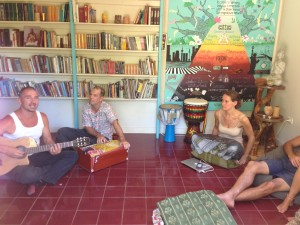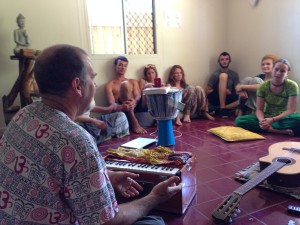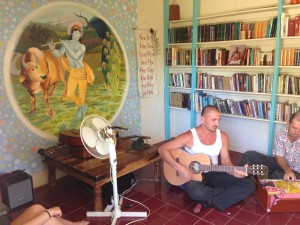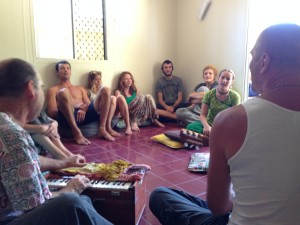 by Jai Sita Rani Devi Dasi Klang - Ratha Yatra 2013
by Jai Sita Rani Devi Dasi Klang - Ratha Yatra 2013 Klang – Ratha Yatra 2013
Pushpa Abhisek – 44th Installation Anniversary of Sri Sri Radha Londonisvara
→ Gouranga TV - The Hare Krishna video collection
Pushpa Abhisek – 44th Installation Anniversary of Sri Sri Radha Londonisvara
Rain or Shine, the Show must go on!!
→ ISKCON Malaysia
BY MULAKARANAM DASA
 KLANG - 19th Annual Chariot Festival, the Ratha Yatra Klang, a grand finish despite the heavy rain! Well done organisers! It was a stunning experience with the Bengoli devotees came out in full force chanting and dancing. They distributed their own T-shirts beautiful bright yellow with black wordings. HH Janananda Goswami Maharaja and another sannyasi from Australia added great blissful feeling to the visitors and devotees. Hari Hari Bol! All Glories to Srila Prabhupada!
KLANG - 19th Annual Chariot Festival, the Ratha Yatra Klang, a grand finish despite the heavy rain! Well done organisers! It was a stunning experience with the Bengoli devotees came out in full force chanting and dancing. They distributed their own T-shirts beautiful bright yellow with black wordings. HH Janananda Goswami Maharaja and another sannyasi from Australia added great blissful feeling to the visitors and devotees. Hari Hari Bol! All Glories to Srila Prabhupada!
Happy Holidays from Your Toronto Hare Krishna Temple!
→ The Toronto Hare Krishna Temple!
Bukit Mertajam – Harinam 2013
→ ISKCON Malaysia Photos
Bukit Mertajam – Harinam 2013
→ ISKCON Malaysia Photos
Bukit Mertajam – Harinam 2013
→ ISKCON Malaysia Photos
Bukit Mertajam – Harinam 2013
→ ISKCON Malaysia Photos
Bukit Mertajam – Harinam 2013
→ ISKCON Malaysia Photos
Bukit Mertajam – Harinam 2013
→ ISKCON Malaysia Photos
Bukit Mertajam – Harinam 2013
→ ISKCON Malaysia Photos
December 25th, 2013 – Darshan
→ Mayapur.com
The post December 25th, 2013 – Darshan appeared first on Mayapur.com.
An Unforgettable Night – Candlelit Sunday Feast
→ The Toronto Hare Krishna Temple!
However, spirits remained high and all of the aratis (services) and offerings for our beautiful Deities, Sri Sri Radha Ksira-Chora Gopinatha, went right on schedule. As Sunday wore on, it became evident that we wouldn't have power for our weekly Sunday Feast. At first, we thought nobody would show up, but we decided the show must go on and planned a simple evening program. Of course, the temple was hosting HG Vaisesika prabhu and HG Nirakula mataji and their presence took things from "simple" to "simply wonderful"!
What played out was a stunningly beautiful Sunday Feast, with (amazingly) approximately 100 guests present. Candles were placed ALL around the Temple Room and with no microphones, it was pin-drop silence that welcomed each inspiring word that HG Vaisesika prabhu spoke. Everyone's collected voices chanted in kirtans that warmed the heart, if not the entire body!
Of course, words can only say so much. So allow us to present some stunning pictures from the event. Captured with high exposure and wide aperture settings (thanks to Tarun and Manish prabhus), we were able to capture some incredible visuals from the program, despite the very low lighting! These might very well arguably be some of the best photos of 2013! Check them out:
How can we identify false ego while doing services?
→ The Spiritual Scientist
When do questions move from being inquisitive to offensive? What kind of questions can be asked?
→ The Spiritual Scientist
Is chanting with beads more blissful because the fingers are connected with certain brain parts?
→ The Spiritual Scientist
Announcement: “Spiritual Quotes” started; services needed; Full Bhakti Shastri Course videos uploaded
→ The Spiritual Scientist
Starting "Spiritual Quotes":
In this feature, I will be posting quotes from acharyas in the Gaudiya Vaishnava tradition (except for Srila Prabhupada whose quotes will continue to be published in the Prabhupada quotes category), as well as spiritually meaningful quotes from other sources such as scriptures - Vedic and non-Vedic; and saints and thinkers from different traditions.
Services Needed:
1. Images: Those who visit Gitadaily.com may have noticed the introduction of images with the daily articles since Gita Jayanti. I am grateful to Bishnu Mahapatra P for this service. Many readers have appreciated this feature and suggested that images can be similarly added to more posts on both gitadaily.com and thespiritualscientist.com. For this, we need volunteers who will find or prepare images based on the content as well as suggestions provided by me whenever necessary. Those interested can look at recent articles on gitadaily.com to see the articles and get a general idea of the kind of images needed.
2. Apps: Several visitors have suggested that apps will make both the sites more easily accessible through cellphones. We need volunteers with the technical competence to make these apps. A sample of the kind of app needed is the app associated with krishnadrive.com
Those who would like to volunteer for any of these services can do so here:
http://www.thespiritualscientist.com/get-involved/
Full Bhakti Shastri Course videos uploaded
All the 162 one-hour videos for the four books of the Bhakti Shastri course have been uploaded on youtube. These include the longest and the most systematic course on the Gita (108 lectures) I have conducted till now. Also included are 22 lectures on the Ishopanishad, 19 on the Nectar of Instruction and 13 on the Nectar of Devotion.
In keeping with the spirit of brahminical culture that knowledge should be shared freely, these videos have been made available free for everyone. Those who wish to not just hear the lectures but also get the Bhakti Shastri certificate can register at bhakticourses.com by paying the charges of Rs 2,500.
Thank you.
Your servant,
Chaitanya Charan das
Wonder
→ Seed of Devotion
When I was 17, for several months I lived at this quiet retreat center / temple in Hawaii, doing some accounting service. Some days would go by when I would not see or talk to another soul. I lived in a deep, otherworldly silence.
I would go on long japa meditation walks in the morning. I saw God at every step, I felt Him with every breath. I saw God in the vast reflections of the sky in giant puddles. Or when I would take off my eyeglasses, the sun would shine through the canopies of leaves in millions of pentagons of light, like waterfalls of glitter, and I would marvel at God's engineering. Or I would kneel down and stare at the way rain would create patterns in the soil. There was this one plant that, when its leaves were gently stroked, would react by folding in on itself like a shy child.
Sometimes on my walks I would put aside my chanting beads and sing songs at the top of my lungs. The cows and horses would turn to look at me curiously, even stop chewing their cud. I befriended a horse - I named him Hayagriva.
At night, I was teaching myself how to play harmonium on this old, beat-up instrument. I would sit on a picnic bench outside and sing sacred songs and the holy name for hours. My mind would wander the windswept hills and the clear blue line of the ocean's horizon. When night fell, billions of diamond stars would emerge against the blue-black velvet sky.
The line between this world and the next would blur. When I was living there and also in the many years since, I have acknowledged that this was one of the most beautiful, profound times of my life. I seemed to be discovering something and someone so much greater than myself. It was a time when I thought that if this was what it was like to devote my life to loving God exclusively, then I would gladly become a nun.
In the years since, I have developed my desire to be married and one day have my own children. I pray that I may approach marriage with this same sense of love and wonder. And maybe one day, when my child is a teenager, I'll let him or her go spend some time at a quiet retreat center in Hawaii.
The Lord is the only rest for our heart
→ The Spiritual Scientist
"You have made us for yourself, O Lord, and our hearts are restless until they rest in you."
St Augustine, Confessions
What Is The Situation
→ Japa Group
TRANSLATION
Arjuna inquired: O Kṛṣṇa, what is the situation of those who do not follow the principles of scripture but worship according to their own imagination? Are they in goodness, in passion or in ignorance?
PURPORT
In the Fourth Chapter, thirty-ninth verse, it is said that a person faithful to a particular type of worship gradually becomes elevated to the stage of knowledge and attains the highest perfectional stage of peace and prosperity. In the Sixteenth Chapter, it is concluded that one who does not follow the principles laid down in the scriptures is called an asura, demon, and one who follows the scriptural injunctions faithfully is called a deva, or demigod. Now, if one, with faith, follows some rules which are not mentioned in the scriptural injunctions, what is his position? This doubt of Arjuna's is to be cleared by Kṛṣṇa. Are those who create some sort of God by selecting a human being and placing their faith in him worshiping in goodness, passion or ignorance? Do such persons attain the perfectional stage of life? Is it possible for them to be situated in real knowledge and elevate themselves to the highest perfectional stage? Do those who do not follow the rules and regulations of the scriptures but who have faith in something and worship gods and demigods and men attain success in their effort? Arjuna is putting these questions to Kṛṣṇa.
Bhagavad-gītā As It Is 17.1
Easier For One To Always Chant
→ Japa Group
"One who thinks himself lower than the grass, who is more tolerant than a tree, and who does not expect personal honor but is always prepared to give all respect to others, can very easily always chant the holy name of the Lord."
Srila Bhaktisiddhanta Saraswati Thakura says that this verse teaches one how to chant without offences by mentioning the four qualities necessary for non-stop chanting. In other words, by possessing these four devotional traits it will be much easier for one to always chant the holy name. The sastras prescribe constant chanting as the way to remove all offences.
From Illuminations on Nama Aparadha
by Mahanidhi Swami
SJMKL Gita Jeyanthy 2013 Celebration
→ ISKCON Malaysia
BY SJMKL EDITORIAL TEAM
KUALA LUMPUR - The Bhagavad Gita (BG) or The Song of Bhagavan, often referred to simply as the Gita, is a 700-verse scripture that is part of the ancient epic, Mahabharata. It is presented in 18 chapters and each chapter deals with a particular and separate form of yoga; where it serves to train the mind and body.
The setting of this majestic scripture in the battlefield of Kurukshetra, has been interpreted as an allegory or tale for the ethical and moral struggles within us and of the problems of human life. In essence, the applicability of the principles of The Bhagavad Gita to crisis management involving the mind, body and soul is clearly stated. Unlike others, The Bhagavad Gita is the only book that deals with all these three aspects and is a compilation of words as directly spoken (verbatim) by LORD KRISHNA Himself; others are credited as testimonies. The BG has been extensively translated and is available in more than 59 languages. The world’s first braille version of this scripture, with the original Sanskrit text and a Hindi commentary was published on 30 November 2007.
The Bhagavad Gita As It Is is accepted as the essence of all Vedic knowledge as quoted in the Gita-mahatmaya 7
In the present day, people are very much eager to have one scripture, one God, one religion, and one occupation.Therefore, let there be one scripture only, one common scripture for the whole world – Bhagavad-gita.Let there be one God for the whole world – Sri Krishna and one hymn, one mantra, one prayer – the chanting of His name:Hare Krishna, Hare KrishnaKrishna Krishna, Hare HareHare Rama, Hare RamaRama Rama, Hare Hareand let there be one work only – the service of the Supreme Personality of Godhead
Ultimately, ISKCON Founder Acarya A.C. Bhaktivedanta Swami Srila Prabhupada gives the conclusion that society should be “Krishna conscious” - enlightened by devotion (bhakti) to Lord Krishna (God). Suffice to say that HDG A.C. Bhaktivedanta Swami Srila Prabupada spread the essence of the Bhagavadgita to the four corners of the world. Lord Krishna demanded of it and Swami Prabupada and ISKCON have facilitated this.
Always think of Me, become My devotee, worship Me and offer your homage unto Me. Thus you will come to me without fail. I promise you this because you are My very dear friend. - BG 18.65
Many great souls have referred to The Bhagavad Gita as their source of inspiration. Mohandas Karamchand Gandhi for example, took shelter in the Gita for its emphasis on selfless service and he said:-
When doubts haunt me, when disappointments stare me in the face, and I see not one ray of hope on the horizon, I turn to Bhagavad-Gita and find a verse to comfort me; and I immediately begin to smile in the midst of overwhelming sorrow. My life has been full of external tragedies and if they have not left any visible or invisible effect on me, I owe it to the teaching of the Bhagavad Gita
Devotees at Sri Jagannatha Mandir, ISKCON Malaysia Headquarters in Taman Yarl , Kuala Lumpur were fortunate to witness the symbolic yet modest Annual Celebration of the introduction of the Bhagavad Gita on Friday 13th December 2013. They were among the fortunate few to have had the privilege and good fortune to be part of this auspicious event.
To mark the occasion, Gokul Garden children recited verses from The Bhagavad Gita As It Is and were duly rewarded with medals for their effort by The Regional Secretary, Simheswara dasa.
To further encourage the distribution of BG, The Management offered The Bhagavad Gita As It Is at a subsidized price of RM25.00 (normal price – RM35.00). A total of thirty (30) books were sold.
Why the Lord is never attracted to material beauty
→ The Spiritual Scientist
There is a common proverb that a confectioner is never attracted by sweetmeats. The confectioner, who is always manufacturing sweetmeats, has very little desire to eat them; similarly, the Lord, by His pleasure potential powers, can produce innumerable spiritual beauties and not be the least attracted by the false beauties of material creation. One who does not know alleges foolishly that Lord Krishna enjoyed women in His rasa-lila in Vrindavana, or with His sixteen thousand married wives at Dvaraka.
Simple for the Simple, December 23, Vrindavan
Giriraj Swami
 Giriraj Swami read and spoke from Srimad-Bhagavatam 5.1.19.
Giriraj Swami read and spoke from Srimad-Bhagavatam 5.1.19.
“Kabhu na badhibe tomara visaya-taranga. Kabhu means ‘at any time’; visaya-taranga—’the waves of sense gratification.’ ‘You will not at any time be affected by the waves of sense gratification.’ Punarapi ei thani pabe mora sange—’rather, you will have My association again, or, you will never lose My association.’ So this is the process. By instructing the brahman Kurma, Sri Chaitanya Mahaprabhu instructed all of us. We can stay wherever we are and always engage in chanting the holy name of Krishna (krsna-nama nirantara laiba) and repeat the message of Krishna (yare dekha, tare kaha ‘krsna’ upadesa, amara ajnaya guru hana tara’ ei desa). And in the end we will have the eternal association of Sri Chaitanya Mahaprabhu. It is so clear. All we have to do is do it. But, as Srila Prabhupada said in a lecture in Boston, ‘Krishna consciousness is simple for the simple, but difficult for the crooked.’ ”
Wwoofer Program
→ Ramai Swami
New Govardhana is host to Wwoofers, (Willing Workers on Organic Farms) from all over the world. At any given time there are 35-45 who stay there from one week to two months.
ISKCON Scarborough – Special guest speaker on Friday and new year eve program on Tuesday
→ ISKCON Scarborough
Hare Krishna!
Please accept our humble obeisances!
All glories to Srila Prabhupada!
All glories to Sri Guru and Sri Gauranga!
Friday - December 27th 2013
We are very fortunate to have the association of HG Yugal Kishore das prabhu at ISKCON Scarborough coming Friday - December 27th 2013. Prabhu will be giving a special class on the topic of "Reincarnation".
The program starts at 6.45pm.
HG Yugal Kishore prabhu is a brahmacari who has dedicated his life to serve in the mission of Srila Prabhupada.
Prabhu travels intensely to spread the message of Lord Chaitanya and is also known for his wonderful kirtans.
The verdict of all revealed scriptures is that by even a moment's association with a pure devotee, one can attain all success.
Tuesday - December 31st 2013
We will usher in the year 2014 in a glorious manner with a non stop 3 hour Hare Krsna Maha Mantra kirtan from 9 pm to 12 am at ISKCON Scarborough.
The program for 31st Dec 2013:
7 pm to 8 pm - Grand free vegetarian feast.
8 pm to 9 pm - review of special events that took place at ISKCON Scarborough in 2013.
9 pm to 12 am - Ecstatic Kirtan by Radha Murari group, HG Dhiranitai das, HG Paripurna das and others devotees.
12 am to 12.30 am - Grand new year Arti
12.30 am to 12.45 am - Distribution of Spiritual gifts
We welcome you, your family and friends to our weekly programs every Friday, Saturday and Sunday and for the special new year eve program on Tuesday.
With best wishes from,
ISKCON Scarborough
3500 McNicoll Avenue, Unit #3,
Scarborough,Ontario,
Canada,M1V4C7
Email Address:
iskconscarborough@hotmail.com
website:
www.iskconscarborough.com
Entry with Post Format “Video”
→ Traveling Monk
Lorem ipsum dolor sit amet, consectetuer adipiscing elit. Aenean commodo ligula eget dolor. Aenean massa. Cum sociis natoque penatibus et magnis dis parturient montes, nascetur ridiculus mus. Donec quam felis, ultricies nec, pellentesque eu, pretium quis, sem. Nulla consequat massa quis enim. Donec pede justo, fringilla vel, aliquet nec, vulputate eget, arcu. In enim justo, rhoncus ut, imperdiet a, venenatis vitae, justo.
Nullam dictum felis eu pede mollis pretium. Integer tincidunt. Cras dapibus. Vivamus elementum semper nisi. Aenean vulputate eleifend tellus. Aenean leo ligula, porttitor eu, consequat vitae, eleifend ac, enim. Aliquam lorem ante, dapibus in, viverra quis, feugiat a, tellus.
Phasellus viverra nulla ut metus varius laoreet. Quisque rutrum. Aenean imperdiet. Etiam ultricies nisi vel augue. Curabitur ullamcorper ultricies nisi. Nam eget dui. Etiam rhoncus. Maecenas tempus, tellus eget condimentum rhoncus, sem quam semper libero, sit amet adipiscing sem neque sed ipsum. Nam quam nunc, blandit vel, luctus pulvinar, hendrerit id, lorem. Maecenas nec odio et ante tincidunt tempus. Donec vitae sapien ut libero venenatis faucibus.
Nullam quis ante. Etiam sit amet orci eget eros faucibus tincidunt. Duis leo.
Bhakta Santa is coming to town !
→ ISKCON BRAMPTON
ISKCON BRAMPTON will be hosting it's annual Christmas Day Celebration on DECEMBER 25, 2013. We would like to invite you and your friends and family for this fun occassion. BHAKTA SANTA will be bringing gifts for all the children. CONGRATULATIONS to all the Sunday School students that have completed 1 year of studies as per the Bhaktivedanta College of Eduation and Culture's curriculum. You will be graduating and receiving your certificate during the Christmas Day Celebration.
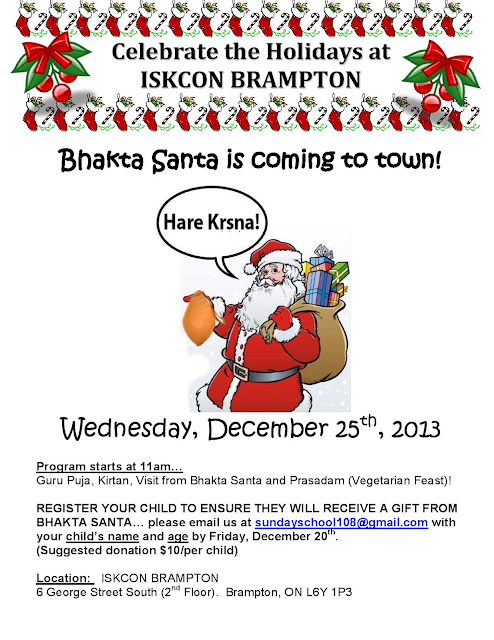
New Vrindaban Daily Darsan @ Dec 24, 2013
→ New Vrindaban Brijabasi Spirit
May the land of Srila Vrindavana where Subala and the other wonderful cowherd boys, who are all dear friends of Sri Krishna, play, where Lalita and the other splendidly beautiful young gopis, who are all filled with love for Srimati Radharani, enjoy transcendental bliss, and where Sri Sri Radha-Krishna thirst to enjoy wonderful transcendental amorous pastimes day and night, become manifest in my heart. 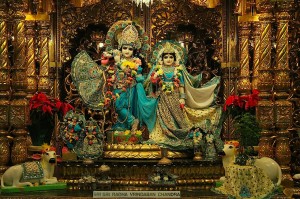
Sunday, December 22nd, 2013
→ The Walking Monk
Forgive and Forget
To the gathering at the ISKCON Centre I read from the Bhagavad Gita and then spoke on the topic of forgiveness based on Chapter 11, verse 41 and 42:
“Thinking of You as my friend, I have rashly addressed you ‘Oh Krishna’, ‘Oh Yadhava’, ‘Oh my friend’, not knowing Your glories, please forgive whatever I may have done in madness or in love. I have dishonoured you many times, jesting as we relax, lay on the same bed, or sat or ate together, sometimes alone and sometimes in front of many friends. Oh infallible one, please excuse me for all those offenses.” - Spoken by Arjun to Krishna.
Some Points Covered on “Forgiveness”
Definitions:
Apology: acknowledgement of offense and expression of regret.
Regret: feel sorry
Forgive: pardon
Quotes:
“The beauty of a brahmin is his ability to forgive.” Chanakya Pandit
“One should be tolerant and excuse the minor offenses of others.” Srila Prabhupada.
“Ksama (forgiveness) is a quality of the Divine Nature.” Bhagavad Gita 16.1
Additional Points:
Don’t take things so personally. You are not this body.
If you are offended consider yourself an offender.
“I am sorry”: the three most difficult words to say. Once said, a great burden is lifted.
Use your hatchet to bury itself.
It is the greatest shame to always hold a blame.
“Give” is the bigger part of the word, “forgive”.
Forgiveness: the thaw after a hard freeze.
May the Source be with you!
3 KM
SUNDAY FEAST PROGRAM – 29th December
→ Welcome to the official site of ISKCON Perth
Dear Devotees & Friends,
We would like to invite you all for the Sunday Feast Program on 29th December 2013.
SUNDAY FEAST PROGRAM
4.00 pm Kirtan
4.30 pm Japa
4.45 pm Tulasi Arati
5.00 pm Special Class On Bhagavad Gita and its application in daily life by H. G Mani Bandha Prabhu.
5.45 pm Japa
5.50 pm Announcements
6.00 pm Arati
6.30 pm Prasadam feast
7.00 pm Clean up
You can sponsor a Bhagavad Gita on this special occasion of Gita Jayanti
A humble request:
“Drivers, please be aware of children and drive safely on temple grounds.
Parents, please ensure children are supervised at all times. ”
IF YOU WOULD LIKE TO SPONSOR A FEAST OR HELP IN ANY SERVICE, PLEASE CONTACT:
Syama Sarana das(0439 969 002) or
Sitaram Lakshmana das(0422 045 525)
Attend such a wonderful feast and receive the Lord’s mercy of full spiritual benefits with Kirtan, Aarti and Spiritual Discourse.
Hare Krishna.
Saturday, December 21st , 2013
→ The Walking Monk
More Tests
More tests. Mahidhar’s 93 year old dad passed away last night. We had dedicated some mantras on his behalf. Bless him. Mahidhar felt relieved.
While Mahidhar’s vehicle was in for repairs, Peter and I had a contingent plan for getting back to Vancouver to meet appointments there. At the town Cache Creek, our anticipated bus trip floundered. It arrived one and a half hours late. We then found out that no seats were available. Next plan – Gosh Thakur agreed to drive us to Vancouver, but before we could make it to Highway One, the fan belt to his vehicle came undone. We had no recourse but to wait to see if the Ford Escape would become road worthy.
So wait we did. But in the nicest way. Our community in the valley was honouring the passing of one of the great saints of his time. It happened to be the anniversary of the passing of Bhaktisiddhanta, the guru of our guru. Many achievements go to his credit, including the promotion of parikrama (pilgrimage). He would organize and partake in pilgrimages in India in around the turn of the last century. He did substantial walking, leading his followers to sacred places, to birth sites of saints and avatars and places of significant spiritual events.
At the Saranagati ISKCON Centre, I was requested to read to the group of Bhaktisiddhanta’s great accomplishments. It then donned on me that I could add him to my mental list of walking heroes. Already there are such personalities or sages such as Narada, who as a young boy trekked in many different directions, and then finally achieved the ability towards interplanetary travel; Vamana, the avatar who became famous for taking three steps; Balaram, Krishna’s brother, who averted the Kurukshetra war in favour of pilgrimage; Vidhura, who reacted justifiably to the insult of his nephew, taking to the wandering monk’s lifestyle. There’s more.
Now I can add to the list of monastic travellers, this great personality, and I’ll spell out his name with honourific titles. His Divine Grace Bhaktisiddhanta Saraswati Thakura Prabhupada.
Back to my own travels. Well, we made it to Vancouver, Mahidhara’s oil pan got replaced. Finally. And as far as walking goes, I’m sad to say I didn’t do any.
Life is full of tests. How are you taking them?
May the Source be with you!
0 KM
Contemplating Temporal and Eternal Family
→ Karnamrita.das's blog
(this blog is recorded on the full page: quick time player is needed; works best with Firefox or Explorer; if you are using Google Chrome it will automatically play, so to not listen, mute your speakers.)
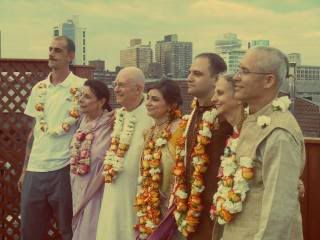
Family blood ties are impelling
we give them energy and attention—
whether they’re compatible or caustic
blissful or fairytale sounding to others—
we can’t change, or bring back, our history
or modify time we’ve spent together
so we tolerate or emphasis the best
though we may try to forget
or laugh at the pain of our shared issues
our experiences together still shape us
as our basic foundation in this life;
our past lives have created our present
which can soften bad feelings, or victimhood
since everything happens for a reason
and no one is completely innocent
in family dynamics and interactions.
For the purpose of a family reunion
we drive 12 hours to South Florida
SB 01.05.02 – Don’t let the quest for physical and mental productivity deprive us of spiritual productivity
→ The Spiritual Scientist
SB 01.05.03 – The materially magnificent can’t compensate for the spiritually deficient
→ The Spiritual Scientist
Harinama Sankirtana Festival in Bukit Beruntung
→ ISKCON Malaysia
 KUALA LUMPUR - On 15th December Sri Jagannatha Mandir congregational preaching team under the direction of Kripa Sindhu Krishna and Krsna Candra prabhus organized a festival of Harinama Sakirtana, Palanquin procession, Book distribution, prasadam distribution in Jalan Teratai 10 section BB 11, Bukit Beruntung, Selangor, Malaysia.
KUALA LUMPUR - On 15th December Sri Jagannatha Mandir congregational preaching team under the direction of Kripa Sindhu Krishna and Krsna Candra prabhus organized a festival of Harinama Sakirtana, Palanquin procession, Book distribution, prasadam distribution in Jalan Teratai 10 section BB 11, Bukit Beruntung, Selangor, Malaysia.
Three pairs of devotees perform Vaishnava marriage in the temple of Dynamo, Moscow, Russia (Album 207 photos)
→ Dandavats.com
 In the varanashram system, the grihastha ashram is the stomach of the social body in that it nourishes all others. Naturally, maximum devotees choose this ashram. Srila Prabhupada taught that the grihasta ashram was meant to create a happy situation to practice bhakti. With proper understanding and interdependence between the husband and wife, such householders can prove to be great examples to the society, which is ridden with conflicts especially with regard to family life. -- Read more ›
In the varanashram system, the grihastha ashram is the stomach of the social body in that it nourishes all others. Naturally, maximum devotees choose this ashram. Srila Prabhupada taught that the grihasta ashram was meant to create a happy situation to practice bhakti. With proper understanding and interdependence between the husband and wife, such householders can prove to be great examples to the society, which is ridden with conflicts especially with regard to family life. -- Read more › How life is filled with misery
→ The Spiritual Scientist
“Fie upon this wretched life which affords one only misery. To live is to experience nothing but disease and pain. Pursuing in turn religion, wealth and pleasure, one endeavors much but receives little happiness. While everything leads to salvation, that is an impossible goal to achieve.”
Ekachakra brahmin at whose house the Pandavas were residing, Mahabharata translated by Krishna Dharma Das
The pope wisely said that a shepherd will be known by his carrying the smell of his flock
→ SivaramaSwami.com
The post The pope wisely said that a shepherd will be known by his carrying the smell of his flock appeared first on SivaramaSwami.com.
Preaching in Israel through Prasad distribution (7 min video)
→ Dandavats.com
 Vibhishana Das - preaching Krishna consciousness in Israel. In the video he is is being interviewed in Hebrew by Peleg Hai Levanony, who produced this video. English subtitles have been provided -- Read more ›
Vibhishana Das - preaching Krishna consciousness in Israel. In the video he is is being interviewed in Hebrew by Peleg Hai Levanony, who produced this video. English subtitles have been provided -- Read more › 














